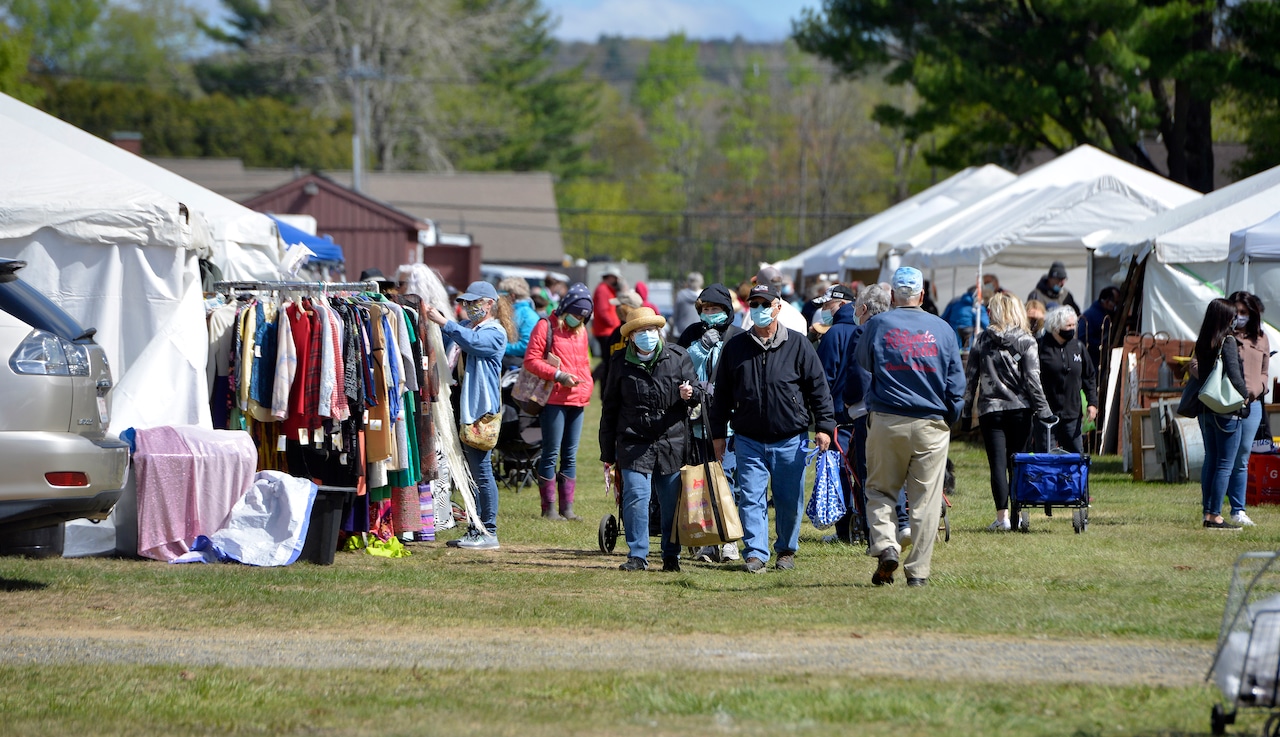For the Roxbury-based nonprofit Stone House, which helps survivors of domestic violence, reaching a 50-year milestone is a bit of a double-edged sword, according to its chief development officer, Gina Varamo.
“Every nonprofit ultimately has a goal to not exist. So ultimately I would love for us to not be here for 50 years because that would mean that we wouldn’t have domestic violence in our community,” Varamo said. “However, with that said, I think to hit 50 years means that we’ve served the community in the way that they’ve needed and wanted.”
But for staff member Caroletta Shaw-Boyd, a former Stone House client, she was very grateful the Stone House existed.
“Stone House has taught me to be fine,” said Shaw-Boyd, who also a support group facilitator. “Fine, to me, is focused, inspired, not alone and empowered.”
Stone House has been helping survivors of domestic violence, like Shaw-Boyd, feel empowered for 50 years. The non-profit organization was founded in 1974 “as an alternative to institutionalization for women with mental health issues,” Stone House’s website reads.
Since then, the nonprofit has expanded to provide support for adult, child and family survivors of domestic violence.
“We’ve always kind of been open to anybody that’s experiencing DV and has been welcome into our doors,” Varamo said.
Aside from celebrating its 50th anniversary this year, Stone House also has its 29th annual Wilderness Heals hike coming up in July. The 3-day, women-only hike in New Hampshire’s White Mountains is the organization’s largest fundraiser. Each hiker raises money for Stone House and this year’s funds will go towards the emergency shelter, Varamo said.
More information about the hike, including how to register, can be found online.
Expanding who they serve
The organization has evolved to not only help cisgender women, but also men, LGBTQ+ individuals, lower-income individuals, people of color and immigrants.
Varamo said these different identities impact how these individuals “move through the world” and interpret their experiences. This often poses a unique set of challenges, as well.
“Maybe they are not documented and they don’t qualify for food stamps. So they’re working around a language barrier, a documentation barrier while also experiencing DV,” she explained. “Or we have folks that are not able to access certain places. So something that we really try to think about in our work too is access.”
In other words, Stone House excels at looking at the bigger picture of domestic violence and its clients.
“Thinking about all the different experiences that these folks are bringing in is really important to providing a truly holistic and healing experience as opposed to just thinking about this one aspect of their life,” Varamo said. “I think that’s something that everyone, our staff, really strives for. And I hope that that’s something that our clients can do. Feel when they’re in our spaces.”
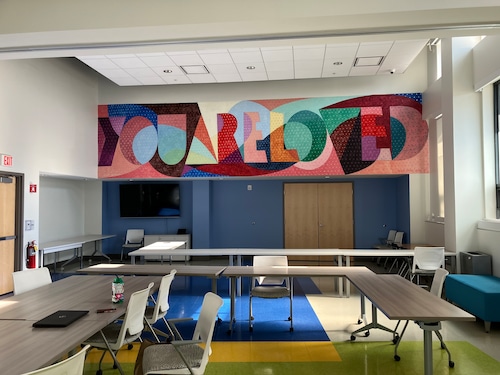
Common areas inside Stone House.David Cifarelli
In addition, the tactics that abusers use to control victims are often specific to these groups, including immigrants and the LGBTQ+ community, according to Crisis Intervention Specialist Ariana Barbas.
As a domestic violence survivor herself, Barbas said her former partner used to say that she would “out her” to her family and friends.
“It was always one of my biggest fears,” she recalled. “Or they’ll always kind of hold over your head, ‘Oh, you’re not actually gay. Things like that, that’s a big piece.”
Immigrants who are domestic violence survivors also experience their own kind of manipulation from their partners, such as threatening to take their Green Card or their children, according to Barbas.
“So there are lots of different ones, but I want to make sure we’re covering a big spectrum of it because it is all different kinds of relationships,” Barbas concluded.
Overall, Stone House looks to provide resources for as many domestic abuse survivors in Boston as possible so they can feel safe, empowered and independent.
‘Amazing people’
For Shaw-Boyd, who started as a client and eventually joined the staff at the Stone House, it is the staff that truly makes the organization shine.
“The people that work here are amazing people,” Shaw-Boyd said. “I think that every single one of them has a passion for this work.”
A Birmingham, Alabama native, Shaw-Boyd has lived most of her life in Roxbury, Dorchester and Mattapan. Shaw-Boyd suffered incarceration, domestic violence, substance abuse “due to some unhealthy choices” as a young adult, she told MassLive.
“At some point, enough was enough, and I had to take certain steps to get into a place to assure that my past did not become my present,” she said. “Stone House was very key for that.”
When she first arrived, Shaw-Boyd was “broken, torn and without [her] children.”
“I was there for a few years and there were obstacles that I had to face and Stone House helped me to face them,” she said. “Stone House helped me with my voice [and] to be able to stand and first admit my faults.”
Shaw-Boyd’s first obstacle was getting her children back, which Stone House helped with by prepping Shaw-Boyd for court where she eventually regained custody of her children.
Aside from helping her get her children back, Shaw-Boyd said Stone House taught her how “to be a productive member of society and deal with the traumatic things” in her past.
“The key part for me as a client was not only were they listening, but they heard what I was saying,” Shaw-Boyd said.
At the time Shaw-Boyd was a resident, men and boys were not allowed at Stone House. In fact, boys over 12 are typically not allowed at domestic violence shelters for women. However Stone House made an exception for Shaw-Boyd, who had her young son with her at the time.
That policy officially changed in 1978 when Stone House opened the first domestic violence shelter in Boston that encouraged women to bring their children. The organization also officially welcomed its first male into its transitional housing program in 2011, according to Stone House’s website.
“We listened to our community. We wanted to keep families together. So we started including young boys in our shelter,” Varamo said. “We have a lasting presence in the community because folks know that we’re here and we listen.”
Finding the next place
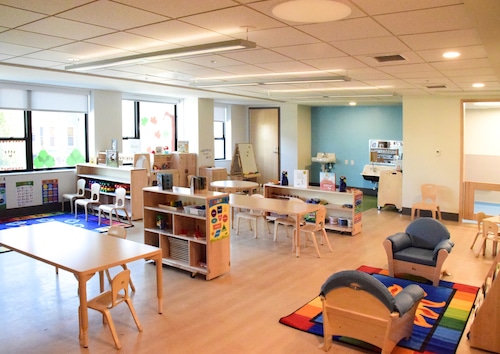
The Early Learning Center at Stone House.Courtesy Photo
This active listening has helped Stone House launch initiatives like its Rapid Rehousing Program and Early Learning Center. Emelly Cabral, another former Stone House client, has benefited from both of those programs.
Cabral, who has lived in Roxbury for 23 years, was involved in “a toxic relationship” with the father of her son for three years, she told MassLive. At the time Cabral and her son were living with her parents, but Cabral did not want to get them involved in her situation.
“My son deserved the best and I deserve the best too,” she added. “So I just left and I was calling every place because it’s hard to get into a shelter.”
Cabral said she “looked for help in the right place” after calling Stone House, adding that the non-profit “was meant for me.” Cabral moved into Stone House in August 2022 with her son, who was 4 at the time.
Clients are connected to Stone House by calling SafeLink, Massachusetts’ statewide 24/7 toll-free domestic violence hotline. SafeLink will then streamline to Stone House’s hotline.
From there, Stone House will tell people if they have rooms available. People are taken in based on either the order in which they call or the severity of their situation. Stone House will also consider other factors like if they have a big enough space for whoever is coming in.
“If there’s a mom and 10 kids, of course we can’t accommodate that,” Barbas said. “But if it’s like a mom and a kiddo or a mom and two kiddos, definitely we want to make sure that the family is going to be comfortable and we’re not setting them up to fail as well.”
In her role, Barbas is the point person for people who need immediate help, such as people who walk into Stone House, as well as clients who are already living at the organization.
Barbas spoke about how “domestic violence is not just a man and a woman,” and that it is much bigger.
“That could be like a mom and a child, it could be grandma and grandson. It could be anything,” she said. “Domestic is household and closeness. That’s what domestic really is.”
Barbas added how 1 in 3 women and 1 in 7 men will experience some form of domestic violence in their lifetime. On average, domestic violence survivors leave and go back to a toxic situation nine times as well. Barbas hopes she can help reduce this statistic.
“I would love to be able to figure out a way to kind of lessen that number, where it’s more like, maybe three or four so I can get them to safety faster so I can have them see that there is a light at the end of the tunnel, and that life is worth living and that love doesn’t have to hurt,” she said.
The average shelter stay for Stone House residents is about two years, but Varamo said the organization will keep people for as long as they need.
“We’re not in the business of kicking folks out if they’re not ready to move on to their next step,” she said. “We’re going to keep people as long as they can, give them all of the services, meet them where they’re at, help them hit their goals, and then once they’re really ready to thrive on their own, we’ll let them go on their own.”
Stone House has one emergency shelter in Dorchester, which is a three-family house that can fit about 20 people. However, the organization is looking to replace this shelter by building a “forever home” that will be up the street from Stone House’s Roxbury facility, Varamo said.
The Roxbury facility has 32 housing units, 10 that work in Stone House’s housing stabilization program. The non-profit also has wider community services, so people don’t have to live in the shelter to utilize those services. People also work with Stone House for different periods of time.
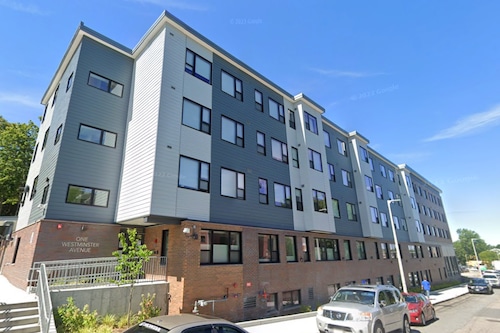
The outside of Stone House’s housing facility at 3012 Washington St. in Roxbury.Google Maps Street View
“Sometimes we’ll see folks for that one moment of crisis, and then we don’t hear from them. Some folks we work with for years and years and years,” Varamo explained. “We want to be with people in their journey at every step to get to where they are going to be successful and independent and fulfilled.”
Despite being housed at Stone House, Cabral still struggled with her mental health initially.
“I was depressed and you do get depressed because it’s a hard situation,” she said. “Then you look at your child and it’s like, you don’t want to be there because you want the best for your child.”
Cabral and her son stayed at Stone House for a year and three months where staff helped her not only move into her first apartment in Roxbury, but also regain her confidence.
“When you come from a DV situation, it’s like you don’t believe in yourself and you’re down,” Cabral said. “But being in Stone House, it helped me bring my self-esteem up. So I appreciate them a lot for that.”
Going beyond basic needs
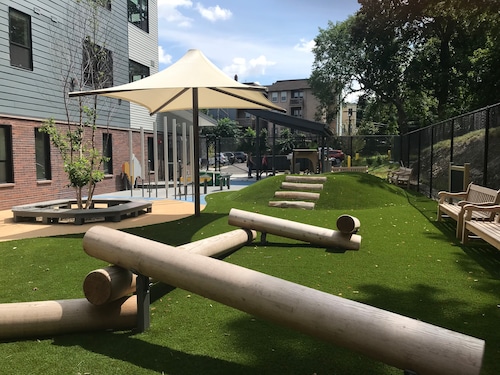
The outdoor playground at Stone HouseCourtesy Photo
Aside from helping residents meet their basic needs (clothing, food, household goods and safe transportation), Stone House’s services include crisis intervention, advocacy, case management, mental health counseling, financial stability and parenting classes.
The nonprofit will also help clients navigate immigration issues and offer support groups that address topics like trauma and anger management, which are usually run by Barbas and facilitated by Shaw-Boyd.
Despite having a full-time job, Shaw-Boyd decides to work part-time at Stone House because her passion “is to be there and to maybe put in those little pieces that may have been missing for me, for the next woman or the next family coming through.”
“There is a need for people to give, whether it’s financially, whether it’s with time, because I’m sure that if you look into anybody’s family history, even your own, you’ll find that there’s something in your life that Stone House can help with whether it’s a family member, a friend, or whatever,” Shaw-Boyd said about the importance of giving back to the organization.
In addition to helping domestic violence survivors regain their strength, Stone House also fosters close relationships.
Cabral said she had “a good roommate” and still talks to most of the people she met while living at Stone House. The young mother even developed a family-like bond with another resident.
“There was this lady on the first floor. I saw her more like my mother because she’s way older than me,” Cabral said. “I speak to her every day.”
“Did I meet friends? Absolutely. Some of my best support came from that weekly house meeting,” Shaw-Boyd said. “Some of my best support came from groups, and there was a wealth of information there and that taught me that I wasn’t alone.”
Shaw-Boyd added, “Years ago, our motto was ‘once a Stone House member, always a Stone House member’ and that’s still true today.”
“We want to support folks and to have lasting relationships,” Varamo said. “I think it’s a testament to be around for 50 years. It just means that we listen authentically to folks in our community and we want to be there.”
“We don’t just care because we get paid the big bucks, because we know we don’t,” Barbas said. “We care because we’re survivors. We care because we know someone is a survivor. We care because we know it’s a problem.”
As someone who has been doing her work for about seven years, Barbas said that Stone House is “the most inclusive, understanding, open and warm organization” she has ever worked for.
“When you walk in there, it feels different,” she said. “It reminds me of like that fuzzy blanket when you’re feeling down and you wrap yourself in a fuzzy blanket. That’s Stone House, they’re the fuzzy blanket that you need.”





